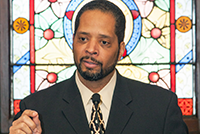Among the hundreds of items passed by the Chicago City Council at its April 24, 2020 meeting was funding for Mayor Lori Lightfoot’s nascent INVEST South/West project.

Ald. Anthony Beale (9)
Announced last October, the mayor’s project aims to reinvigorate the West and South Sides, in part by jumpstarting local businesses.
The Chicago Department of Planning and Development (DPD) will channel the initiative through 12 West and South Side “priority corridors” where the city will focus on “transportation, housing, and quality of life enhancements.”
Initial funding for these measures, as described in the ordinance (O2020-1817) passed on April 24, pays two contractors for five years each. National Main Street Center, to be paid up to $500,000 per year, would train and support community organizations and city staff to help grow local businesses. Payment would come from the city’s corporate fund.
And Local Initiatives Support Corporation would be paid up to $1,200,000 per year to create and deploy a “marketing program” for each of the 12 commercial districts targeted by the program. Payment would come from 18 of the city’s tax-increment financing (TIF) districts.
During a March meeting of the City Council’s finance committee, Jim Harbin, a DPD deputy commissioner, said LISC would hire or contract with “individuals or organizations to . . . perform such functions as identifying, engaging, and following up with existing and prospective businesses” and “locating vacant property owners and landlords to track existing and available space.”
For each INVEST South/West priority corridor, LISC will seek community members to do the work.
“We will approach each community to identify potential partners in that community,” LISC executive director Meghan Harte said during the same meeting. “And we will absolutely seek guidance from the local alderman for suggestions of community partners.”
Some of those local aldermen, though, have their doubts.
Two of the priority corridors, 47th/Ashland and 63rd/Halsted, lie within Ald. Jeanette Taylor’s 20th Ward.
In an interview, Taylor said she's skeptical that the city’s Invest South/West implementers will actually work with her and her constituents.
Taylor said she had been given no input as to the city’s use of TIF to fund work in the priority corridors.
“Telling us that you’re going to invest in the South and West Sides” with “no real conversation with the community about spending TIF dollars is problematic for me,” Taylor said.
“TIF dollars are supposed to help blighted communities,” Taylor said. “So there should have been an ask before they designated those dollars.”
The lack of consultation by the Lightfoot administration on the priority corridor rollout foreshadowed a city initiative addressing the COVID-19 pandemic, Taylor said.
Pointing to Lightfoot’s recent announcement of a COVID-19 Recovery Taskforce, Taylor said the mayor “picked some folks that we don’t really know, that are not necessarily connected to the community.”
“I’m supposed to believe these people will protect black folks on the South and West Sides from dying?” Taylor said. “But that’s not even a conversation that was had with aldermen.”
Ald. Anthony Beale (9) said in an interview that he “had no input into the selection” of the INVEST South/West priority corridors within his ward, which includes the Michigan Ave. priority corridor.
“We’ve had great results with job creation and using TIF money in the Pullman corridor, where we’ve been able to leverage over $430 million in public-private partnerships,” Beale said, adding that he had highlighted those figures during a ward tour with DPD Commissioner Maurice Cox.
“I stressed that these are the things that we need to do to keep the ball rolling . . . along Michigan Ave.,” Beale said. But city planners are “absolutely not” collaborating with him on planning for Michigan Ave., he added.
“I find it troubling that all the people on the ground doing work are not being talked to,” Beale said.
Likewise, Ald. Roberto Maldonado (26) said he has been frustrated that the planning department has turned away what he considers worthy development projects near INVEST South/West’s North Ave. priority corridor.
Maldonado said that he does not “expect that the city’s going to do too much” with INVEST South/West going forward, because the Lightfoot administration’s attention “is concentrated on pandemic issues.”
Questions remain as to whether the TIF districts will be able to fully fund initial development efforts in the priority corridors.
Although the city has committed to paying its INVEST South/West contractors through 2025, at least five of the 18 TIF districts that feed into the program are due to expire during the next five years.
A version of this story originally appeared in The Daily Line.





